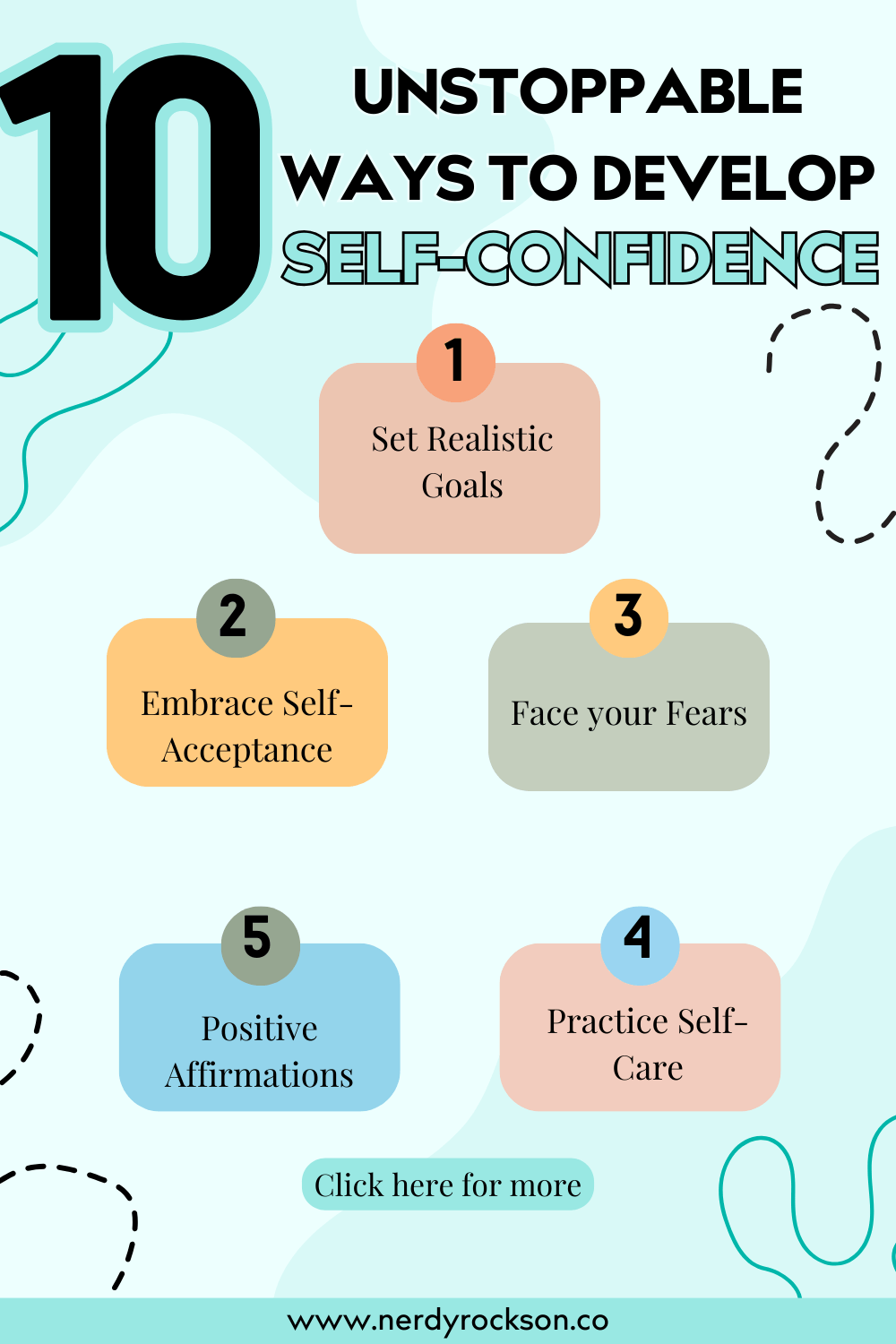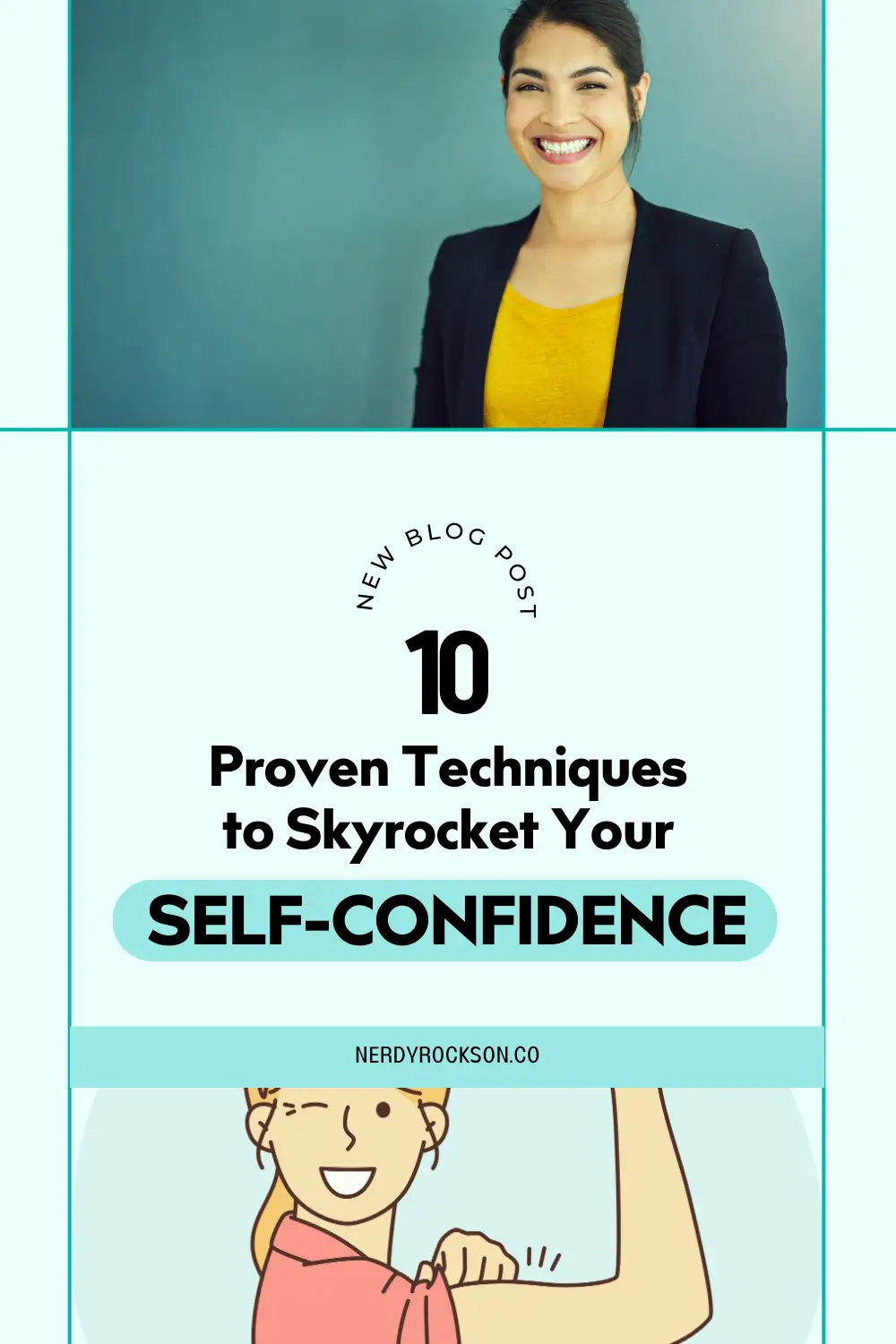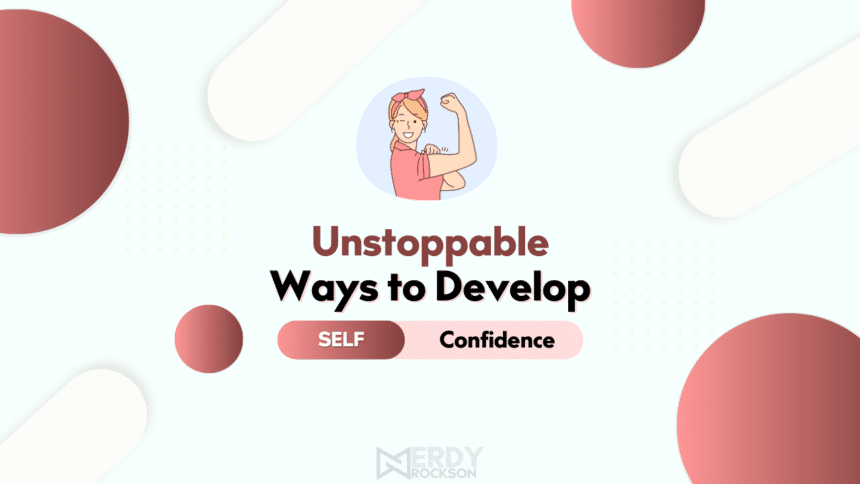Are you looking for ways to develop self-confidence? You’re not alone. Confidence is the backbone of success, and it’s not as elusive as it may seem. Studies have shown that confidence can increase motivation, happiness, and satisfaction with life. Recognizing its importance, this article will delve into ten ways for you to develop self-confidence and live a more fulfilling life. [1]
A comprehensive study published in the Journal of Personality and Social Psychology states that self-confidence, described as a belief in one’s capacity to achieve desired outcomes, significantly impacts overall performance, resilience, and success. [2] By implementing the strategies outlined in this article, you can harness the power of self-confidence and become an assertive advocate for yourself.
Developing self-confidence doesn’t come instantly. A research study by Dr. Richard Petty, a professor of psychology at Ohio State University, revealed that lasting change in self-confidence comes from within. It’s about changing how you think about yourself and your capabilities, not just how you present yourself. [3]
In short, having self-confidence can elevate your quality of life. With it comes the freedom to take risks, the ability to overcome adversity, and the power to pursue your dreams. This comprehensive guide will aid in your journey. So let’s begin this exploration of how to develop self-confidence using these well-researched, practical, and effective methods.
HOW TO DEVELOP SELF-CONFIDENCE

Fortunately, there are several ways you can increase your self-confidence. Regardless of whether you lack confidence in one specific area or struggle to feel confident about anything, these ten tips can help you develop self-confidence.
1. Set Realistic Goals
Setting realistic goals is the foundation of self-confidence. It’s not about limiting your aspirations. No, this is about setting yourself up for success rather than disappointment.
The key lies in ‘realistic’. Don’t rush into preparing an extensive list of ambitious goals that intimidate you. Instead, break them down into smaller, more manageable ones. These smaller goals are steps towards your larger goal that’s much more achievable, giving you a confidence boost each time you tick one off.
Let’s say you want to learn a new language. An unrealistic goal would be to become fluent in three months. It’s possible but quite challenging and could lead to disappointment. A more realistic goal would be learning some common phrases or basic grammar within that timeline.
- Choose measurable goals: You can evaluate your progress more easily if your goals are quantifiable.
- Ensure they are achievable: Always consider your current situation, resources, and constraints.
- Set deadlines: Deadlines keep you focused, and motivated, and foster a sense of urgency. But remember, they must be realistic!
As you can meet your realistic goals, your self-confidence will naturally grow. Because now, you’re proving to yourself that you can do it, and that’s an essential belief for building confidence.
So go ahead, jot down your goals and make them realistic. Remember, every big accomplishment starts with small steps. Keep your momentum going, and soon you’ll be looking back on a journey of success that seemed impossible when you started. That’s the magic of setting realistic goals!
2. Embrace Self-Acceptance
Self-acceptance is a compelling journey towards self-confidence, which starts deep within you. Accepting oneself means fully acknowledging your strengths, weaknesses, thoughts, and emotions without any form of judgment. It’s about being at peace with who you are.
But, how do you learn to embrace self-acceptance?
- Identify your Strengths and Weaknesses: Be honest about your abilities and areas you can improve. Everyone is a combination of strengths and weaknesses and acknowledging this fact is the first step towards self-acceptance.
- Stop the Comparison Game: It’s human nature to compare ourselves to others, but it’s also one of the greatest hurdles to self-acceptance. Your life and your journey are unique to you. So, instead of matching up to others, focus on being the best version of yourself.
- Forgive Yourself: We all make mistakes. What matters most is learning from them and forgiving ourselves. Holding grudges against ourselves only makes acceptance harder.
- Practice Gratitude: Celebrating what you have rather than mourning what you don’t is an excellent step towards self-acceptance. Be thankful for your talents, your accomplishments, and even your struggles as they shape you.
Embrace self-acceptance and let the world see the authentic, confident you. The road to self-confidence often starts with acceptance. By learning to love and value yourself, just as you are, you set the groundwork for a powerful, enduring confidence that emanates from within.
“To be yourself in a world that is constantly trying to make you something else is the greatest accomplishment.”
Ralph Waldo Emerson
3. Face your Fears
Facing your fears may seem daunting, but it’s an essential step to boosting self-confidence. Imagine, every fear concealed represents a limit on your potential. The longer you avoid it, the more power it holds over you. But when you summon the courage to confront it, you can often find that it wasn’t as terrifying as you once thought.
Consider this process as a journey, starting with identifying your fears. Write them down in a list. It could be a fear of public speaking, fear of failure, or fear of rejection. Whatever it may be, acknowledging them is the first step to conquering them.
- Recognise the Fear: Fear often comes from the unknown. Therefore, accepting the fear – acknowledging its presence and understanding why it affects you – can diminish its influence.
- Take Small Steps: You don’t need to overcome everything at once. Small achievements build new and positive experiences, replacing the negative ones associated with your fear.
- Build Resilience: Build resilience by learning from your experiences. Instead of viewing them as failures, see them as learning opportunities. This resilience further helps in extinguishing the fear.
There’s wisdom in the saying ‘Courage doesn’t mean you don’t get afraid. Courage means you don’t let fear stop you.’ As such, each fear faced is a stepping stone toward greater self-confidence.
In the end, remember that growth can be uncomfortable, but it’s worth it for the confidence that comes with knowing you can handle anything life throws your way. So, start seeing your fears as opportunities to become stronger and more confident.
The next step to developing self-confidence takes the topic in a slightly different direction: positive affirmations.
4. Positive Affirmations
Do you know, that acknowledging your worth can create wonders in boosting your self-confidence? Affirmations are positive statements that help you to overcome negative thoughts. When you repeatedly say these affirmations, you start believing in them and make positive changes in your life.
Affirmations like “I believe in myself”, “I am capable”, and “I can handle anything that comes my way” might seem trivial at first, however, consistently reminding yourself of these could have a significant impact on your mindset. It’s a simple yet powerful way of reprogramming your brain to believe in your capabilities.
- Monitor your thoughts: Be conscious of what you are thinking. Invite more positivity and shun the negativity.
- Write down your affirmations: Writing has always been a powerful tool. It makes your affirmations more real and personal.
- Repeat them often: Make it a routine to say these affirmations to yourself, early in the morning or before going to bed.
Remember, the more you speak to yourself positively, the more you feel confident and believe in your abilities.
As a tool for boosting self-confidence, positive affirmations, when used appropriately, have been linked to reduced stress levels and perceived mental well-being. They catalyse the process of self-confidence building by helping you maintain a constant positive self-image and outlook towards life.
Consider trying this for a few weeks and observe the transformation, you’ll likely be pleasantly surprised by the changes it brings in your self-belief and confidence!

5. Practice Self-Care
What’s a more beautiful way of claiming self-confidence than taking care of oneself? None, I dare say. Nourishing your physical, emotional and mental well-being is not simply a luxury; on the contrary, it’s an essential aspect of a healthy life and a confident persona. Let’s roll up our sleeves, shall we?
Physical self-care: involves activities that improve your physical health, including exercise, proper nutrition and sufficient sleep. Groaning about that morning jog or an extra serving of veggies? Grumble not! These activities work wonders by improving your physical health and boosting your mood.
- Exercise: Not only does it improve your health, but also contributes to a sense of accomplishment. Seeing your endurance increase or your waistline decrease can significantly boost your self-confidence.
- Nutrition: A well-balanced diet provides the energy you need to face the day with enthusiasm and confidence.
- Sleep: Never underestimate the power of a good night’s sleep. It can rejuvenate your mind and body, making you feel more confident and ready to take on anything that comes your way.
Emotional self-care: is all about acknowledging and respecting your feelings. It’s perfectly okay to pamper and soothe your emotional being from time to time. Remember, it’s not a sign of weakness but a testament to your strength and maturity.
- Express Yourself: If something is troubling you, don’t bottle up your feelings. Confide in a friend or write in a journal. Giving voice to your feelings can boost your morale and self-confidence.
- Relaxation techniques: Techniques such as meditation, yoga and deep breathing can also decrease stress and boost your self-esteem.
Mental self-care: boggles around stimulating your mind and diminishing stress. A well-nurtured mind breeds confidence. It’s like the old saying, ‘a sound mind in a sound body.’
- Learning: Pursue a new interest or hobby (go on then, take that mixology class you’ve always fancied!). It not only keeps your brain active and engaged but also helps in developing a positive self-image.
- Mindfulness: By being present and engaged in the here and now, you can grow your abilities to focus, create, and accomplish – the bedrock of confidence.
Tire not; for this is the sweet journey towards self-confidence. Remember, by engraining these self-care strategies into your daily routine, you’re not simply adopting a healthier lifestyle, but you’re also taking meaningful strides towards self-confidence. One more thing, be patient with yourself. Changes don’t occur overnight. Stay optimistic!
6. Surround Yourself with Positive Influence
It’s essential to understand the influence that your environment has on your self-confidence. The people you associate with can significantly influence your perception of yourself and the world around you. Surrounding yourself with positive influences can do wonders in boosting your self-assurance.
How does this work? Well, it aligns with the adage: “You’re the average of the five people you spend the most time with.“ In essence, when you spend time with individuals who are self-assured, optimistic, and supportive, you’re more likely to adopt these traits.
- Choose your inner circle wisely: Spend time with those who reflect the values you want to adopt. Encourage relationships with reassuring, uplifting folks who inspire you to believe in yourself.
- Avoid toxicity: It’s equally vital to avoid negative people who constantly criticise others and themselves. Such an attitude often ends up influencing you, affecting your self-worth and confidence.
Indeed, we learn through observing and mimicking others. Hence, surrounding yourself with positive individuals will subtly guide you towards positive thoughts, ultimately fostering your self-confidence.
“When you are pursuing your dreams, they will call you CRAZY because they are LAZY. They never know you are a HERO who just jumped away from step ZERO. Stay away from negative people; they will only pull you down. Be around those who inspire you to do better and motivate you for greatness.”
Israelmore Ayivor
This does not mean you should cut off anyone who has a negative outlook. Instead, manage your interactions and ensure the most frequent and potent are those that build you up and inspire positivity.
7. Improve your body language
Body language, without a doubt, greatly influences the impression you make on others. But did you know that it also significantly affects how you perceive yourself? It’s true. Your physical posture, expressions, and gestures aren’t merely outward manifestations, they’re also sending messages back to you. Adopting confident body language can make you feel strong, capable, and well, self-assured. Let’s delve into some key ways to boost your confidence through improved body language.
Stand Tall: It may sound simple, but standing tall and pushing your shoulders back does wonders for your self-confidence. It radiates strength and authority, but more importantly, it makes you feel in control and self-assured. Try it, you’ll be surprised at how this small adjustment can cause a shift in your internal state of mind.
Maintain Eye Contact: Maintaining a steady gaze while speaking or listening is a vital aspect of confident body language. It indicates that you’re engaged, interested, and assertive – all hallmarks of a confident person. Start practising this skill with friends and family, gradually working your way up to using it in professional or more intimidating settings.
Use open gestures: When we’re nervous or unsure, we tend to make ourselves smaller by hunching over, crossing our arms, or hiding our hands. Turning this around involves using open, expansive gestures that take up a bit more space. These postures are associated with power and can boost your confident feelings exponentially.
Microexpressions: These brief, involuntary facial expressions can reveal a lot about your emotional state. Through the improvement of emotional awareness and the ability to control micro-expressions, you can present a calm, confident front even during challenging times.
Note: Improving body language is a journey that requires practice, patience, and self-awareness. Remember, even small changes can lead to big improvements in your confidence.
8. Seek Continuous Learning
When it comes to bulking up your self-confidence, never underestimate the value of continuous learning. Like an ever-filled reservoir, knowledge provides a sense of empowerment and self-efficacy. It’s an unrivalled confidence booster!
An unquenchable thirst for knowledge is a quality shared among the most successful and confident individuals. They continuously explore new concepts, challenge existing beliefs and foster an environment conducive to growth and development. You see, this uncanny commitment to knowledge acquisition doesn’t simply elevate one’s expertise in a particular field but equally enhances overall self-confidence.
- And no, continuous learning doesn’t mean you need to join an academy or enrol in a graduate degree (though there’s no harm in that!). Start by identifying areas where you wish to expand your knowledge and skills. This could range from technology to arts, fitness, finance, or even public speaking.
- Next, there are fantastic resources available right at your fingertips! We’re living in the ‘Information Age’, after all. Consider subscribing to informative blogs, downloading eBooks, joining relevant online communities or why not subscribe to a podcast or two!
- Don’t forget good old-fashioned books, workshops or seminars. Whether online or offline, commit to making the most out of this world of knowledge.
In the pursuit of knowledge, we often stumble upon the discovery of our own potential, talents, and capabilities—things we didn’t even know we had. As we expand our horizons, we naturally become more adaptable, resourceful and, most importantly, confident. Remember, every new thing you learn is a step up on your self-confidence ladder. So, start climbing!
9. Practice Positive Self-Talk
Yes, you heard right, talking to yourself can be a good thing! Not all the whispers in our minds are helpful, however. Often, the chatter in our thoughts veers towards the negative, pulling down our self-confidence. So, let’s flip the script and practice positive self-talk!
Positive self-talk is the act of literally telling yourself positive things. Instead of focusing on the negative, you concentrate on the positive aspects of yourself and your life. It’s very similar to positive affirmations, but it’s more about how you talk to yourself in your basic day-to-day narrative rather than focused moments of positivity.
Here’s a simple example for you. Next time you’re about to embark on a task and you hear yourself thinking “I’ll probably mess this up”, turn that thought around to say “I’m going to do the best I can and that will be enough”. Suddenly, the expectation isn’t crippling perfection, it’s effort and growth. And that’s something to be proud of!
To put this into practice, let’s follow these easy steps:
- Identify Negative Talk: The first step is awareness. Listen to your thoughts, and identify patterns of negative self-talk. You can’t change what you’re not aware of.
- Stop it in its tracks: Once you identify a negative thought, consciously stop it. You can even say “STOP” out loud if you need to!
- Flip it: Now, here comes the fun part. Take that negative thought and turn it into a positive one. If the negative thought was “I can’t do this”, the positive flip might be “I’ve tackled difficult tasks before, I can do this!”
- Repeat: Finally, keep repeating this process. With time, it will become second nature!
Our minds are powerful tools, and like any tool, they can be used to build us up or bring us down. By practising positive self-talk, we aim to use our minds to develop that ever-important self-confidence. Remember, you’re in control of your thoughts, and you have the power to make them work for you!
10. Celebrate Victories, Both Big and Small
Celebration is not just about throwing a grand party every time you achieve something. It’s about acknowledging the effort you put into attaining that success. When you take a moment to celebrate your victories, both big and small, you’re acknowledging your abilities and allowing yourself to feel proud of your accomplishments; and this, my friends, can be a tremendous confidence booster.
For example, you mastered a new skill. Great! You finished a critical work project. Fantastic! You completed a challenging workout. Superb! Every achievement, regardless of size, is a testament to your capabilities and hard work. So, let’s celebrate them!
Celebration doesn’t always need to be grandiose, you know. It can be as simple as indulging in your favourite dessert, spending a few extra minutes pampering yourself, or starting the next day a little later than usual. You deserve it because you’ve done something great, and you should acknowledge that.
So, let me share a few simple and practical steps on how you can savour your accomplishments:
- Recognise your achievement: Take a moment to acknowledge that you have accomplished something. Give yourself credit for your hard work.
- Savour the moment: Allow yourself the time to enjoy your success. Let it sink in, and appreciate the feeling.
- Reward yourself: Treat yourself with something you love. It doesn’t have to be expensive, just something that genuinely makes you happy.
- Share your success: Talk about your victory with your loved ones. Their positive responses will help reinforce your confidence.
- Document your achievement: Write it down in a journal, or update your LinkedIn profile. It’s a great reminder of what you can do when you set your mind to it.
In conclusion, remember that it’s not about being boastful or showing off. This is about recognising your worth and nurturing a healthy sense of self-esteem. Each small step, each minor triumph, brings you one step closer to the self-assured individual you aspire to be. Every victory, no matter how small, is a stepping stone on the path to self-confidence.

Confident vs Insecurity
Understanding the differences between people brimming with self-confidence and those wrestling with insecurity can help in your journey on how to develop self-confidence. Here are just some of the differences between the two.
| Confident People | Insecure People |
|---|---|
| Open-minded | Close-minded |
| Decisive | Indecisive |
| Laugh at themselves | Hide their flaws |
| Optimistic | Pessimistic |
| Take risk | Avoid risk |
| Take responsibility | Blame others |
| Appreciate their worths | Question their worth |
| Celebrate other people’s success | Jealous of other people’s success |
| Comfortable with praise and also with constructive criticism | Struggle with praise, thinking it undeserved, and taking criticism very personally |
Conclusion
In conclusion, the journey to develop self-confidence is a continuous one, and it starts from within. It’s about accepting oneself fully, overcoming fears, and maintaining a positive outlook on life. As Maurice Switzer said, “Speak when you are angry — and you’ll make the best speech you’ll ever regret.”. So, always practice positive self-talk. This complements the process of self-care wonderfully, which is crucial in building self-belief.
Moreover, surrounding yourself with positive influences, whether it’s people, books, or experiences, can significantly boost your confidence. It’s vital to keep refining your skills and embrace a ‘lifetime learner’ approach. Remember, progress, no matter how small is a step forward, so celebrate all victories, big or small. As Mark Twain beautifully put it, “Courage is resistance to fear, mastery of fear – not absence of fear.”
Finally, the key to improving your self-confidence lies in understanding the difference between being confident and being insecure. Maintaining a confident body language says a lot about how you perceive yourself, and it reflects heavily on your interactions with others. Remember, self-confidence comes from within, and it radiates outwards. So take a step toward self-improvement today and awaken the confidence that resides within you. As the saying goes, “Believe you can, and you’re halfway there.”
FREQUENTLY ASKED QUESTIONS
How can you be more socially confident?
To build social confidence, start with self-acceptance and gradually face small social events. Over time, you can engage in larger gatherings, maintaining positivity. Look at socially confident individuals for guidance and remember to practice active listening to form deeper connections and boost your confidence.
How can you be more confident in a relationship?
Building confidence in a relationship is all about open communication. It’s essential to openly share your thoughts and feelings, taking care to listen when your partner does the same. Don’t forget to respect each other’s personal space for individual growth. You both need your own hobbies and personal experiences. Regularly showing appreciation, love, and admiration for one another is key too. Always remember, you’re worthy and deserve a thriving, happy relationship.
How can you be more confident at work?
When it comes to increasing confidence in the workplace, it’s all about embracing the journey of continuous improvement and self-awareness. Remember, you’re there because you’ve got the skills and the expertise. It’s just a matter of showcasing them. Start by having a clear understanding of your role and recognising your strengths. When you are aware of your abilities, you automatically feel more confident. Also, don’t shy away from seeking advice or help when needed. It’s a sign of strength, not weakness.
How can you be more confident about your body?
Boosting body confidence can indeed be a journey, but we’ve got four impressive strategies that might help. First, try to appreciate your body for its function, not just its form. Every part of you is essential for survival, movement, and enjoyment. Second, engage in regular physical activities that make you feel good, and help you stay healthy. These activities should be based on enjoyment, not solely on appearance. Thirdly, dress in clothes that you love and feel good wearing. Lastly, practice positive self-talk about your body.









